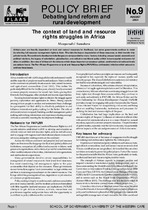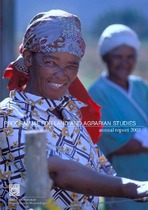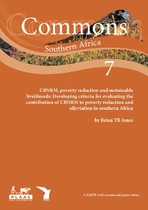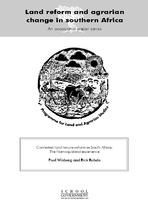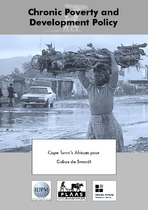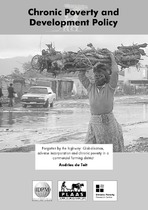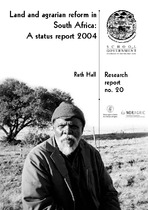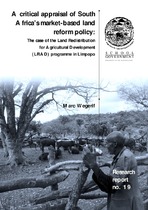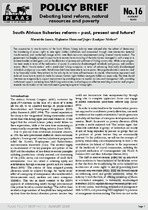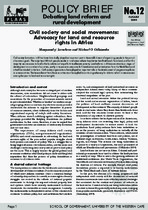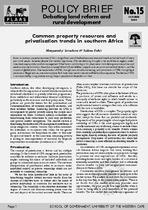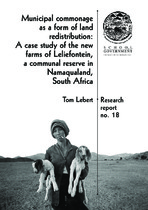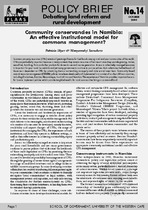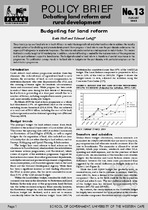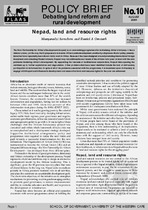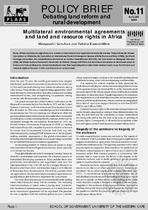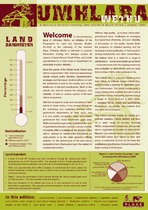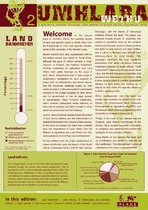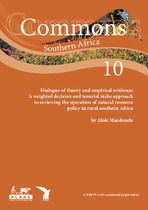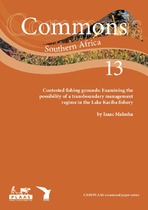Browsing Institute for Poverty, Land and Agrarian Studies (PLAAS) by Issue Date
Now showing items 61-80 of 608
-
The context of land and resource rights struggles in Africa
(Institute for Poverty, Land and Agrarian Studies, University of the Western Cape, 2004)Africa’s poor are heavily dependent on land and natural resources for livelihood, but some governments continue to resist transferring full resource management rights to them. This risks the loss or degradation of these ... -
Annual report 2003
(Institute for Poverty Land and Agrarian Studies (PLAAS), 2004)Applied social science researchers generally want to see their research influence policy and practice; those of a more activist bent seek to ‘change the world, not simply to interpret it’.1 In its mission statement ... -
CBNRM, poverty reduction and sustainable livelihoods: Developing criteria for evaluating the contribution of CBNRM to poverty reduction and alleviation in southern Africa
(Institute for Poverty Land and Agrarian Studies (PLAAS), 2004)This research paper has been prepared as part of the Centre for Social Studies (CASS), University of Zimbabwe/ Programme for Land and Agrarian Studies, University of the Western Cape (PLAAS) programme ‘Breaking New Ground: ... -
Contested land tenure reform in South Africa: The Namaqualand experience
(Institute for Poverty Land and Agrarian Studies (PLAAS), 2004)The legacy of apartheid land policy in South Africa remains one of the most conspicuous manifestations of past injustices. To correct this legacy, diverse land reform efforts have centred on the constitutional mandate for ... -
Cape Town's African poor
(Institute for Poverty Land and Agrarian Studies (PLAAS), 2004)The typical ‘face of poverty’ in South Africa is no longer that of a rural woman engaged in subsistence agricultural production. Poverty today also refers to the large number of unemployed men who wait daily in vain on ... -
Forgotten by the highway: Globalisation, adverse incorporation and chronic poverty in a commercial farming district
(Institute for Poverty Land and Agrarian Studies (PLAAS), 2004)This paper presents key findings from a livelihoods survey of households in four poor neighbourhoods in the Western Cape district of Ceres, one of the centres of South Africa’s deciduous fruit export industry (see Figure ... -
Land and agrarian reform in South Africa: A status report 2004
(Institute for Poverty, Land and Agrarian Studies, University of the Western Cape, 2004)This is the third in a series of ‘status reports’ on land and agrarian reform in South Africa published by the Programme for Land and Agrarian Studies (PLAAS). These reports set out to assess progress, problems and ... -
A critical appraisal of South Africa’s market-based land reform policy: The case of the Land Redistribution for Agricultural Development (LRAD) programme in Limpopo
(Institute for Poverty, Land and Agrarian Studies, University of the Western Cape, 2004)In 1996 less than 1% of the population owned and controlled over 80% of farm land. This 1% was part of the 10.9% of the population classified as white (Stats SA 2000). Meanwhile, the 76.7% of the population that is ... -
South African fisheries reform – past, present and future?
(Institute for Poverty, Land and Agrarian Studies, University of the Western Cape, 2004)Two approaches to transformation of the South African fishery industry were adopted after the advent of democracy: the broadening of access rights to new rights holders (individuals and companies) through state intervention ... -
Civil society and social movements: Advocacy for land and resource rights in Africa
(Institute for Poverty, Land and Agrarian Studies, University of the Western Cape, 2004)Civil society formations in Africa have historically played an important part in the establishment of organising people in the pursuit of common goals. The majority of Africa’s people reside in rural areas where they ... -
Common property resources and privatisation trends in Southern Africa
(Institute for Poverty, Land and Agrarian Studies, University of the Western Cape, 2004)Access to common property resources (CPRs) is a significant part of the land resource base and therefore the livelihoods of many poor rural people. However, despite their central importance, CPRs are declining throughout ... -
Municipal commonage as a form of land redistribution: A case study of the new farms of Leliefontein, a communal reserve in Namaqualand, South Africa
(Institute for Poverty, Land and Agrarian Studies, University of the Western Cape, 2004)This paper examines the implementation of a quasi-commercial land use system on newly acquired municipal commonage in Leliefontein, a former ‘coloured reserve’ in Namaqualand, Northern Cape. This land has been ... -
Community conservancies in Namibia: An effective institutional model for commons management?
(Institute for Poverty, Land and Agrarian Studies, University of the Western Cape, 2004)Common property resources (CPRs) remain of great significance for livelihoods among rural and poor communities of the world. CPRs are particularly important because in many contexts they remain resources of last resort ... -
Budgeting for land reform
(Institute for Poverty, Land and Agrarian Studies, University of the Western Cape, 2004)The primary purpose of land reform in South Africa is to redistribute agricultural and other land in order to address the racially skewed pattern of landholding and promote development. Slow progress in land reform over ... -
Nepad, land and resource rights
(Institute for Poverty, Land and Agrarian Studies, University of the Western Cape, 2004)The New Partnership for Africa’s Development (Nepad) is an overarching programme for revitalising Africa’s fortunes. It has a visionary tone, yet the way that it proposes to overcome Africa’s underdevelopment uncritically ... -
Multilateral environmental agreements and land and resource rights in Africa
(Institute for Poverty, Land and Agrarian Studies, University of the Western Cape, 2004)Many African countries are signatories to a number of international and regional environmental treaties. These include the Ramsar Convention on Wetlands, the Convention on International Trade in Endangered Species of Wild ... -
Land reform policies under review
(PLAAS, 2004-08)Welcome to the introductory issue of Umhlaba Wethu, an initiative of the Programme for Land and Agrarian Studies (PLAAS) at the University of the Western Cape. Umhlaba Wethu is intended to promote information sharing and ... -
Foreign land ownership under scrutiny
(2004-12)Welcome to the second issue of Umhlaba Wethu, the quarterly update on land and agrarian reform in South Africa from the Programme for Land and Agrarian Studies, based at the University of the Western Cape. Recent months ... -
Dialogue of theory and empirical evidence: A weighted decision and tenurial niche approach to reviewing the operation of natural resource policy in rural southern Africa
(Institute for Poverty Land and Agrarian Studies (PLAAS), 2005)Considerable research has been conducted on community-based natural resource management in rural southern Africa. Many interesting insights have accumulated from the literature on the research issues of earlier generations. ... -
Contested fishing grounds: Examining the possibility of a transboundary management regime in the Lake Kariba fishery
(Institute for Poverty Land and Agrarian Studies (PLAAS), 2005)Community-based natural resources management (CBNRM) programmes in the southern African region emerged as a reaction to colonial ‘fortress’ conservation policies that criminalised and marginalised local people, preventing ...

